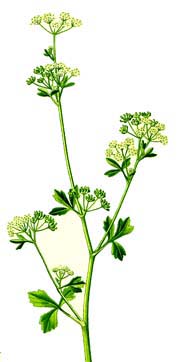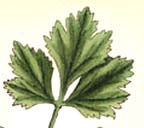|
 Apium graveolens Apium graveolens
Smallage
The Renaissance magician known as Agrippa wrote in his Three
Books of Occult Philosophy that smallage was useful in
suffumigations (incense) for either gathering or dispersing spirits.
He called coriander, henbane,
poison hemlock, and smallage
as "spirit herbs" because when they were burned together,
they brought spirits together. Note, though, that he also recommends
burning this herb for the opposite effect. He writes that burning
a fume of sagapenum (in the same plant family as asafoetida and
galbanum), poison hemlock juice
(yikes!), henbane, mullein,
red sandalwood, and black(-seeded)
poppy causes spirits and visions (apparently false) appear,
and that adding smallage causes them to disappear. Either way, Agrippa
associates smallage with spirits. Top
 Some recipes for flying ointments include smallage
mixed together in oil or fat with monkshood,
belladonna, poison
hemlock, and cinquefoil.
What was
it about this herb that made people connect it with the others?
According to one modern source, the ancient Romans connected this
herb with death and used it in funeral wreaths, and it was found
woven into funerary wreaths in Egyptian tombs as well. It could be that
it is this connection--as it came into European popular culture--that
caused it to be grouped with herbs like poison hemlock in a flying
ointment. Later writers consider that smallage is poisonous when
grown wild and a good medicinal herb when cultivated (although we
could not find info that it was ever poisonous at all). The seeds are calming and sedating, which might be very helpful
for sabbatic wanderings (and which explains why some contemporary
sources recommend it for dream pillows). There is also the fact that at least one
early modern herbalist considered the ingestion of smallage to cause
epilepsy ("the falling sickness"). This plant is
sacred to the Greek river god Selinos, who was featured on Greek
coins together with a smallage leaf. Top Some recipes for flying ointments include smallage
mixed together in oil or fat with monkshood,
belladonna, poison
hemlock, and cinquefoil.
What was
it about this herb that made people connect it with the others?
According to one modern source, the ancient Romans connected this
herb with death and used it in funeral wreaths, and it was found
woven into funerary wreaths in Egyptian tombs as well. It could be that
it is this connection--as it came into European popular culture--that
caused it to be grouped with herbs like poison hemlock in a flying
ointment. Later writers consider that smallage is poisonous when
grown wild and a good medicinal herb when cultivated (although we
could not find info that it was ever poisonous at all). The seeds are calming and sedating, which might be very helpful
for sabbatic wanderings (and which explains why some contemporary
sources recommend it for dream pillows). There is also the fact that at least one
early modern herbalist considered the ingestion of smallage to cause
epilepsy ("the falling sickness"). This plant is
sacred to the Greek river god Selinos, who was featured on Greek
coins together with a smallage leaf. Top
In terms of the system of humors, smallage is
hot and dry, which makes it a Fire herb. The root is thought to
be aphrodisiac. We did run across the advice of a
cooking book from 1879
that recommended that the leaves of this herb be thoroughly boiled before eating,
because although it is good for the digestion, it is also sexually
stimulating and so "not for everybody." It is certainly
much more intense than regular celery leaves. It's good for flavoring
soups, stews, and savory pies, but don't try to eat the stalks like
regular celery; they are very fibrous. Some gout sufferers
like to use smallage to keep down uric acid levels in the blood;
it contains
various anti-inflammatories. Smallage is also known as marsh parsley, leaf
celery, and wild celery. Top
How to Grow Smallage
Usually
this plant is started outside soon after the last spring frosts,
but you can also start it inside at room temperature. Barely cover
the seeds to germinate in 1-2 weeks. If you've got a spot that gets
a lot of water or doesn't drain well, try smallage there. It likes
full sun and gets 18"/45cm tall. It's usually grown as an annual
(lasts only one year), but it is a biennial in warmer areas (down
to 5F/-15C). Harvest leaves before it flowers in cut-and-come-again
fashion, or harvest all at once by cutting back the plant 3/4 of
the way down. Most biennials make seeds in their second year. General growing
info Top
|
Apium graveolens
Smallage
100 seeds $3.75

Uses in
Witchcraft & Magic:
Necromancy
Banishing
Sabbatic
Work
Underworld Associations
Honoring Selinos
Fire Herb
© 2008-2024 Alchemy Works; No reproduction or
distribution without permission.
|